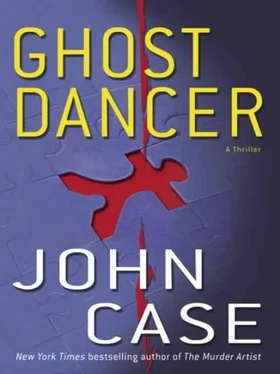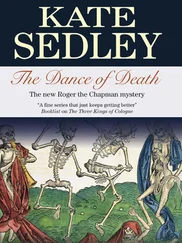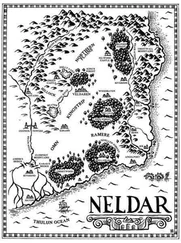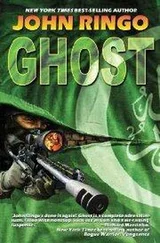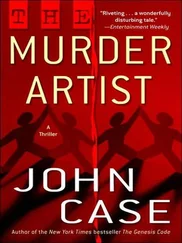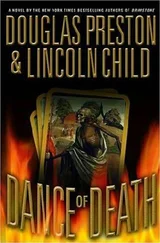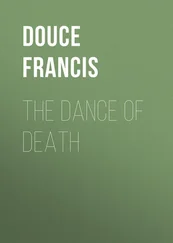It seemed as if he’d been almost ready to claim his cultural inheritance – but a few weeks afterward his life came apart and the opportunity was lost. The State took him away from Mandy, and he got caught up in trying to survive at his new foster home, with its Godsquad parents and seven foster siblings. The closest he got to the Sun Dance again was to write a paper about it.
Until he’d gone to prison, “Jack Wilson” was just a name, a nod to history – like George Washington or Martin Luther King.
This changed once he found himself behind bars, stripped of his invention and his future. Then he realized there was a reason for the name: He was the reincarnation of Jack Wilson. He was the Ghost Dancer.
Suddenly, he understood that what happened to him wasn’t an aberration. It was a logical extension of the earlier genocide of Native Americans. Wilson’s imprisonment was inevitable. If anything, he thought, he was doubly doomed – once for his heritage, and again for his genius. Because, of course, the invasion had long since turned in upon itself, so that the whites were now devouring their best and brightest. Ayn Rand had taught him that.
Lying in the water with his eyes closed, wearing only the ghost shirt that was his skin, it occurred to Wilson that if revenge is a dish that’s best served cold, after ten years – a hundred years! two hundred years! – the temperature should be about perfect.
LONDON | MAY 15, 2005
Mike Burke stood by himself in a rainy breeze on the corner of South Audley Street and Grosvenor Square, watching a door at the side of the U.S. embassy. The day before, he’d seen a flood of workers pour out that door at the end of the day, avoiding the public entrance at the front. So he guessed this was the exit that Kovalenko would use.
It was almost five o’clock, and Burke had already been there for more than an hour. It would have been easier, of course, to wait outside the FBI agent’s apartment. It was probably somewhere around here, or over in Knightsbridge. But Kovalenko wasn’t listed in the telephone book or in any of the online directories Burke tried. To get an address, Burke would have to hire an investigator or sweet-talk someone who had access to the embassy’s internal directories. That would take a while, and he didn’t have the time.
So here he was, getting wet.
The line in front of the embassy snaked halfway around the block, organized by an airport-style rope-and-pole system. The queue was remarkably patient, almost docile, under a conga line of umbrellas. It was like a temporary village, linked to the outside world via dozens of cell phones. People were eating and playing cards, talking, reading, and changing diapers. Every so often, someone would dart around the block to use the facilities, then jog back to thank whoever it was that saved his place in line.
The day before, Burke had waited three hours to see Kovalenko, only to learn that the Legat was unable to “fit him in.” The soonest an appointment could be arranged, he was told, was in three weeks.
Three weeks! Meanwhile, Aherne & Associates would remain shuttered, the information about Wilson would go nowhere, and the old man would probably finish the job of drinking himself to death.
Burke had returned from his travels to Belgrade and Ljubljana to find Kate’s father wallowing in self-pity. “I’m like a clock that you wind with a spring,” he said with a chuckle, “and I can feel myself winding down…” Lest Burke didn’t get the point, he repeated the phrase with a raised eyebrow: “Winding down.” Burke hadn’t been gone for more than a week, but in that week Tommy had reached a point where sobriety was a foreign state. He’d taken to having an eye-opener with his morning coffee, which was a bit like kick-starting a Harley. Most afternoons, he had to be escorted home by one of his friends.
The way Burke saw it, a meeting with Kovalenko was urgent, regardless of any threat Wilson might pose.
From where he stood, Burke made repeated calls from his cell phone to the embassy, asking to speak with the Legat. Each time, he was told that Mr. Kovalenko was in conference, or “away from his desk,” or simply not taking calls. Each time, Burke left a message, assuring the assistant that his business was urgent.
But nothing happened.
If it had been up to Tommy, that would have been the end of it. The old man was of the firm opinion that they should leave the matter to the Irish courts. Their solicitor was confident that Aherne & Associates would prevail, since they’d done nothing wrong. But it might take a while for the case to be heard.
“How long?” Burke had asked.
“With luck,” the solicitor replied, “we should be on the docket by the end of June.”
“June!” Burke and Tommy shouted in unison.
The solicitor had winced. “Or July.”
Which was why Burke was standing in a flying drizzle outside the embassy. He’d waited and waited, and called and called. Now, he was stalking the sonofabitch.
He’d met Kovalenko only once – at the “interview” in the Garda’s office. But he’d recognize him in an instant. The doughy face, the purselike mouth, the piggy little eyes… Time after time, he thought he saw the G-man coming out. But it was always someone else.
Surveillance was an odd business. It was deeply boring, except when it wasn’t, and then it was pure adrenaline. It required the same kind of unfocused attention that long drives demanded. You had to be there and not be there at the same time. Like Schrodinger’s cat.
Burke was beginning to feel conspicuous. It was only a matter of time before a marine guard or a bobby would ask him what he was doing there.
To this worry was added the fear that he might have missed his quarry, that Kovalenko had exited through another door. There must be a parking lot somewhere, behind the building or underground. Maybe Kovalenko had a car, in which case Burke might never see him. He’d almost talked himself into giving up, when Kovalenko came around the corner.
Burke was pretty good at spotting cops. There was something about the way they held themselves, the way they walked. And Kovalenko might as well have been wearing a uniform. In a sense, he was wearing a uniform. His hair was actually combed, and combed in a way that the comb’s teethmarks were embalmed in gel. He wore the regulation Dick Tracy suit, blue shirt, and striped tie. In his right hand, just below the requisite Rolex, was a shining black attaché case. His stride was that of a man who was privileged to carry a gun in a country that despised them.
Burke followed him around the corner and into the Nightingale Arms, a small pub that was all mahogany and cut glass. The place was crowded and smoky, with a mix of young men talking equities and Bond Street shop girls being beautiful.
People were two deep at the bar, where Kovalenko stood. Burke watched him catch the bartender’s eye. Money changed hands and, a moment later, the Legat held a glass of red wine. It was obvious from the interchange that Kovalenko was a regular. He probably came here every night after work.
The FBI agent sat down on a banquette at a small table in the corner, next to a young couple staring into each other’s eyes over pints of lager. Burke touched a chair no one was using.
“Okay if I sit here?”
Kovalenko made a magnanimous gesture: Be my guest.
It annoyed Burke that the G-man did not recognize him, but sat where he was, studying his nails. Which, Burke saw, were neatly manicured.
The crowd was a roar around them, the noise rising and falling like a chorus of cicadas in late summer. Inexplicable crescendoes and fades.
Читать дальше
